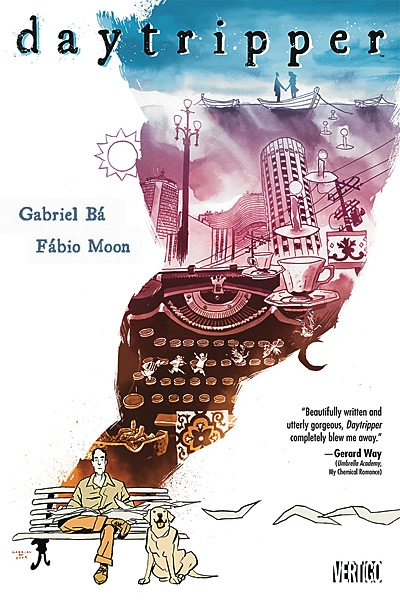The art is good and the location exotic. I can see why it won the Eisner award. The plotting of the story is at first novel but it quickly becomes passe and predictable. The pacing is emotionally taxing and pretty soon, you just want the book to be over.
One reviewer wrote that he "found the writing itself laden with superficial self-importance that can only come when a writer writes about being a troubled writer, sort of Latino Indie Film existential bombast (if that’s possible) complete with lots of cigarette smoking and death. No new or original thoughts, no new insight, other than the well-worn brooding young man who has an overblown sense of self, sort of a simplistic “circle of life” presented in a somewhat clever format, artful and painstakingly arranged. All in all, good for youngsters who have yet to think too much about their mortality. I probably sound like the typical cynical old man offering nothing new of my own, and maybe younger reviewers feel differently. Three stars for good art and the clever manipulation of a well-worn story."
One reviewer wrote: "Let's get this out of the way up front: Daytripper may be the best graphic novel I've ever had the pleasure to read. Consider yourselves warned."
Better than Kirkman's "Walking Dead?" Vaughn's "Better than Y The Last Man" Or even "Satellite Sam?" This same reviewer writes: "Perhaps Daytripper's biggest success is that it saves itself from being cliche. "
I disagree. The one word that resonates throughout his review is cliche of which it is rife.
The main character is whiny and the characters he surrounds himself are two dimensional and shallow. He is annoying - selfish and self indulgent - not a warrior spirit - maybe a lesbian trapped in a man's body. Which is itself a well worn aphorism which may delight the trite and unimaginative unless you like being a man and a strong man. This character was not a strong man
Someone wrote: "Someone stop Brás de Oliva Domingos. He's the obituary writer and he is writing about only himself on a fierce ego trip."
The character is definitely spoiled.
She continues by stating: "I didn't give a fuck about the first chick with the big boobs he meets who is la di da (she didn't want to say she didn't have a job, actually. She never gets one) look at your best friend, Jorge, the photographer. Freedom this and freedom that let's have sex and everything will be free magic. That's fine for them, if they were real, but what is in it for me? I'm drowning in the headstone version of the greeting card. He sees the world through his camera lens, Jorge. Kill me now"
I completely agree.
So many reviewers admit that this piece of art made them cry.
My question is Why did you get teary eyed? What did you see in the character that was admirable or likable? What made you connect or self identify with him?
I cried when I saw "Braveheart." I cried during the Bette Midler film "Beaches."
Why? because the character did not have the nuts to fight for his woman? or to kick her ass out when he was out line? Or connect with his father? What exactly was tragic about this young man's life?
You know what's tragic? Child soldiers are tragic. Human sex trafficking is tragic. Men languishing in jail because they dared to say 2 words: 'I disagree' That's tragic. Some whiny twerp complaining about the brevity of his life and then wasting it away on self loathing is not tragic - it is all too common and maybe worthy of your tears but not mine.
I am glad I read it. I would not read it again. I cannot recommend this book unless you want to know what kind of stories win Eisner Awards.




No comments:
Post a Comment